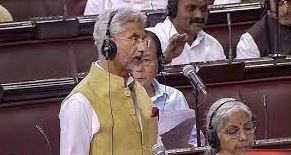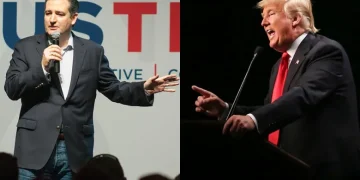New Delhi: External Affairs Minister (EAM) S. Jaishankar Wednesday stated that the Modi government has rectified the historical mistakes made by former Prime Minister Jawaharlal Nehru regarding the Indus Water Treaty (IWT) by putting it in abeyance until Pakistan ceases its support for cross-border terrorism.
Speaking in the Rajya Sabha during the debate on Operation Sindoor, EAM Jaishankar began by expressing deep gratitude to the Indian Armed Forces.
Referring to the April 22 Pahalgam terror attack, he said, “It was a shocking attack for a variety of reasons, the manner in which people were killed in front of their families, the fact that their religion was asked before killing them, and the intent of destroying the economy of Jammu and Kashmir which had returned to prosperity and normalcy after the end of Article 370, all of this angered the country. There was grief and shock. Across the world, there was solidarity and sympathy.”
He emphasised that such an attack was absolutely unacceptable and had crossed India’s red lines.
“There had to be severe consequences. There had to be accountability of the perpetrators, and they and their supporters had to be brought to justice,” Jaishankar said.
He noted that the decision taken by the Cabinet Committee on Security April 23 was the “first clear message of India’s anger, resolve and determination”.
EAM Jaishankar recalled the key steps taken, including the cancellation of Pakistani visas under SAARC, reduction in diplomatic mission strength, expulsion of military advisors, and the holding of the Indus Water Treaty in abeyance.
Describing the significance of putting the treaty in abeyance, he said, “The Indus Water Treaty in many ways is a very unique agreement. I cannot think of any agreement in the world where a country has allowed its major rivers to flow to the next country without having rights on that river. It was an extraordinary agreement, and it is important, when we have put it in abeyance, to recall the history of this event.”
Jaishankar referred to the parliamentary proceedings of the 1960s, quoting the then Prime Minister, who reportedly said the Indian government is keeping in mind the interests of West Punjab (Pakistan’s Punjab).
The EAM said the then PM had the interests of Pakistan “over its own farmers in Kashmir, Punjab, Rajasthan, and Himachal Pradesh.”
“Not a word about the interests of our own people. He said, ‘We purchased peace’. But within a year, that same Prime Minister admitted there was no peace with Pakistan. What we purchased was not peace, but appeasement,” EAM Jaishankar said.
He argued that the treaty, “initially done in a spirit of goodwill and friendship, had become irrelevant as India had received neither goodwill nor friendship from Pakistan since 1960, only terrorism, attacks and wars.”
“Such a treaty had to be dealt with, and this government dealt with it,” he said.
Reiterating the Modi government’s firm position, Jaishankar said, “This was not a price of peace, but a price of appeasement. The Modi government has corrected the mistakes of Pandit Nehru’s policies by suspending the Indus Water Treaty with Pakistan. The Indus Water Treaty will be held in abeyance until Pakistan irrevocably gives up its support of terrorism. Blood and water will not flow together.”
IANS






































